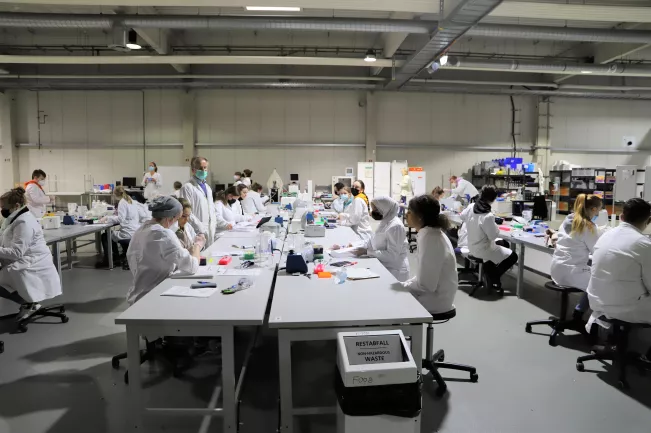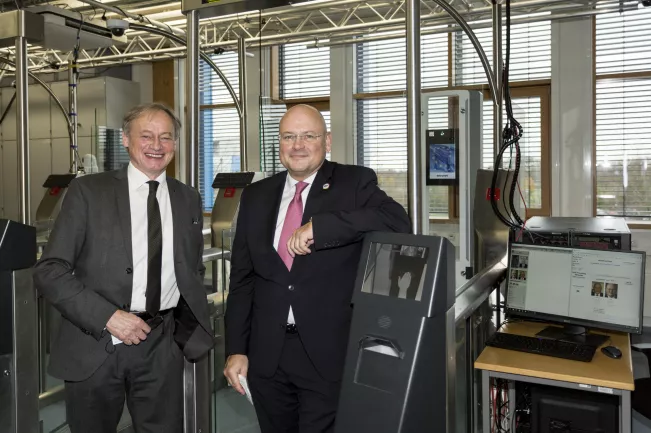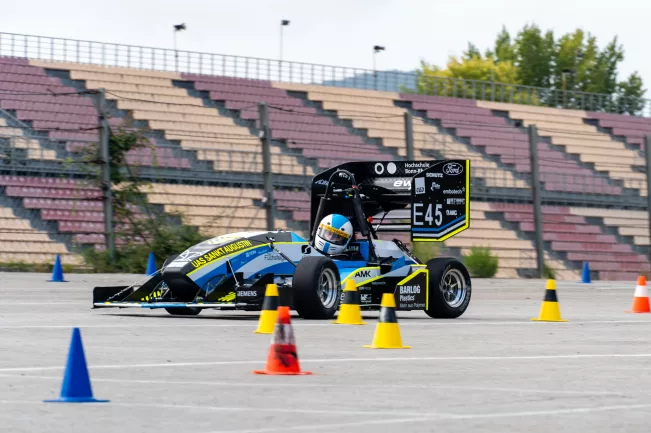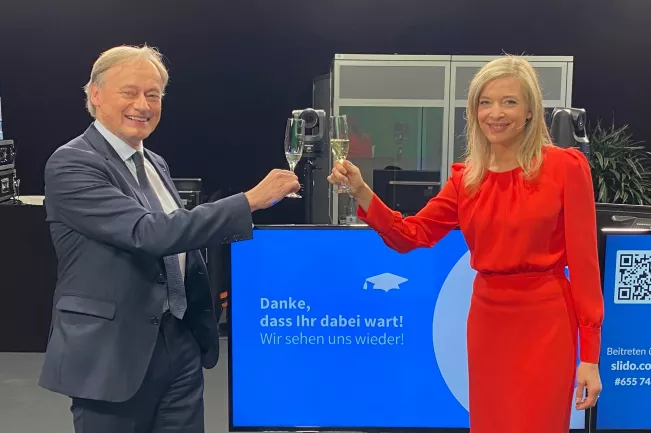Communications and Marketing
2021 at Hochschule Bonn-Rhein-Sieg

This year Hochschule Bonn-Rhein-Sieg dared to scale new experimental heights – at around 400 kilometres above the Earth’s surface. In August the university sent a scientific experiment to the International Space Station (ISS). “Touching Surfaces” is the name of the research project that H-BRS prepared in conjunction with three partners. The scientists use small touch pads made from different metals to find out how microbes adhere to a range of different surfaces. The experiment is being analysed at a range of locations, including the H-BRS Microbiome Center.
Back on Earth, the university had to deal with the consequences of an unexpected manifestation of the power of nature. The severe storms that caused huge damage to the region in mid-July also caused flooding at the Rheinbach campus. Fortunately, no one was harmed. The ground floor levels were under water and the basements were flooded. Any technical infrastructure located there was almost entirely damaged beyond repair. From that point onwards, H-BRS was faced with the twin tasks of arranging repairs to the buildings while making sure that teaching could continue. It succeeded in doing both within the shortest time.

Substitute quarters found and furnished
"None of this would have been possible without the commitment of the university staff and students who have volunteered thousands of hours, first to clear up the campus and then to set up the alternative buildings,” said the President of the University, Hartmut Ihne. “The university surpassed itself. At the same time, we were offered support from many sides as we searched for interim solutions, such as from the municipality of Rheinbach and the University of Bonn, for which we are very grateful."
The university secured the use of multiple alternative buildings while the Rheinbach campus was being refurbished. This includes a building complex 5,000 square metres in size at Heisenbergstraße 16, just a few minutes’ walk from the campus. The university now also has a presence in central Rheinbach at a site previously used by the Pallottine order. Rheinbach’s theatre and municipal hall have also offered the university temporary accommodation, as has the University of Bonn.
Return to attendance
And as if that was not enough, the university has had to overcome another challenge affecting all sites, departments and institutions: the return of face-to-face teaching. While the previous three semesters were dominated by online teaching due to the coronavirus pandemic, the students and teaching staff were due to return to campus at the start of the winter semester. This involved the introduction of the 3G principle for classes, which has also been under review since that time.
H-BRS was already well set in terms of digital teaching before the pandemic, and really drove innovation forward in that area during the coronavirus semesters. As a university with a strong research focus, it became its own research subject, comprehensively analysing the conditions for and effects of online teaching. This period saw the advent of many new and innovative projects, such as the "digital games evening. The idea was to boost the sense of togetherness of those in their first and second semesters despite being physically separated. The Stifterverband für die Deutsche Wissenschaft was so impressed with the execution of the concept that it awarded it the "university pearl of the month".
New institutes, new degree programmes
Similarly, in 2021 H-BRS expanded its programme offering, founded new institutes and appointed further professors. For instance, in November the university opened the Biometric Evaluation Centre at the Sankt Augustin site, where security technologies that use biometric features are researched and tested in conjunction with the German Federal Office for Information Security (BSI). The new Institute for Cyber Security & Privacy started work in June. Its role is to combine research, teaching and academic transfer on topics concerning security and privacy in the digital world under the same roof. The associated bachelor's programme started in the winter semester in the department of Computer Science.

The master’s programme Start-up Development is also new. It provides entrepreneurs with the know-how they need to build their start-up on a secure foundation. From the idea through the business plan up to the market launch – the programme covers all steps in a start-up’s development. H-BRS can draw on a wealth of experience in supporting start-ups - over the past two decades, the university has seen the inception of more than 150 companies. The Start-up-Manufaktur was set up in 2021 as a start-up centre for all of the university’s offers of support.
The foundation of the Institute for Digital Consumption at the start of the year was a premiere not only for the university, but also for Germany. The institute aims to develop new teaching content from this emerging research area. The principal focus is on strengthening consumers’ data protection competence so they can use digital products securely.
Another new addition is the master’s course in Sustainable Engineering, the 39th programme offered at the university. It combines mechanical and electrical engineering with sustainability aspects and focuses on the topics of renewable energies, energy efficiency and environmental technology.
As at 1 December 2021, the university manages 21 bachelor’s and 18 master’s courses, 17 research institutes, five departments and 9,256 students across three sites.
Ten years of the Graduate Institute and a victory on the race track
This year, the number 10 was claimed by the university’s graduate institute: the Sankt Augustin-based institute celebrated its tenth anniversary in October. At that time it was pioneering and over the years has become a role model for initiatives in other German federal states. Its task is to support doctoral students on their route to their doctoral degree. It has also lobbied hard for the establishment of a doctoral college in the NRW region. The aim of this is to enable the Universities of Applied Sciences in North Rhine - Westphalia to which H-BRS belongs - to run doctoral programmes themselves and to award doctoral degrees.

No year without awards and prizes: H-BRS seeks to excel across many areas – and is recognised for doing so at national and international level. For instance, the university’s motorsport group won the Formula Student Spain: the students from Sankt Augustin drove to overall victory on the Barcelona-Catalunya race track. It was principally the design of the new electric racing car, christened “Luna”, that prevailed in the face of strong international competition. The Formula Student involves teams of students competitively racing cars against one another in the style of Formula 1 at alternating locations. The Circuit de Barcelona-Catalunya in Catalonia hosted the Formula Student Spain 2021 for the eleventh time from 4 to 8 August.
In July, stiff international competition also had to be overcome in the robot world championships. The students from Sankt Augustin and their robots took on teams from around the world in two disciplines. The youthful H-BRS team garnered the title of vice world champion in the working robot league and secured fifth place in the league of household robots.

Graduation ceremony with colourful programme via livestream
Just how extraordinary 2021 was in so many respects was also reflected in the way we said goodbye to the graduates. Because there had been no leaving ceremony last year due to the coronavirus pandemic, there were two cohorts of students to say goodbye to. The alumni did not celebrate with their friends and family together in the Telekom Dome, but rather enjoyed an hour-long livestream via their computer – which nonetheless offered a colourful programme of speeches, improvised theatre and live music. And once again the international nature of the Hochschule Bonn-Rhein-Sieg was on display: people tuned in all the way from Egypt, India and even Ecuador to celebrate together across continents.
"I look to the coming year with great confidence," said President of the University Hartmut Ihne. "In an unprecedented show of strength, we have worked together to overcome huge challenges. This has strengthened us as a university. In future, I know I can rely on the innovative power of many fine minds and the creative drive of a strong university community."